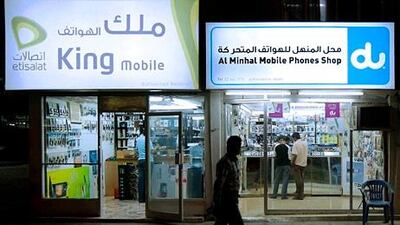Etisalat and du face increases in the fees they pay the Government, analysts said, as the royalty scheme governing both operators was revised for the next five years.
The Ministry of Finance yesterday outlined the new royalty structure, which will be applied to the operators' revenues and profit from this year until 2016.
Etisalat had previously been paying a 50 per cent fee on its net profit to the Government, but the company will now have this amount split between revenue and profit.
As of this year the operator will pay 15 per cent royalty on its revenue and 35 per cent on its profit. The latter rate will drop to 30 per cent in 2016.
"This will definitely have a negative effect for Etisalat," said Petr Molik, the chief financial officer and head of research division at Mena Corp.
"Revenues are much higher than profit and a 15 per cent fee on revenue and 35 per cent on profit will be much more than just 50 per cent royalty on profit."
Etisalat provisioned for a 50 per cent royalty fee on its profits in its quarterly financials. Last year Etisalat paid Dh5.8 billion (US$1.57bn) in royalties, down from Dh7.6bn in 2010 and Dh8.8bn in 2009.
Etisalat is 60 per cent Government-owned with local investors making up the rest. Foreign investors cannot buy shares in Etisalat, which is traded on the Abu Dhabi Securities Exchange.
Du, which is listed on the Dubai Financial Market and open to non-GCC national shareholders, must pay a royalty fee of 5 per cent on revenues and 17.5 per cent on profits this year.
That marks an increase on last year, when du paid 5 per cent of revenues and 15 per cent of its profit.
Du faces further increases in royalty fees. The fee imposed on revenues will rise by 2.5 percentage points every year until 2016, when it will reach 15 per cent.
Royalty fees on profits will rise to 20 per cent next year, then to 25 per cent in 2014 before reaching 30 per cent in 2015 and 2016.
The rise in royalty fees for du is stark compared with previous years, said analysts.
"This increase in royalty rate means less money for the company and as a consequence less money will be paid as dividend or to expand the business or for acquisition," said Mr Molik. "It is definitely great news for the Government though."
The move by the UAE Government adds clarity, given that du's royalty fee has varied and has historically been applied retroactively some time between December and February.
"The royalties were applied retrospectively for du … now investors can have a clearer idea," said Matthew Reed, the principal analyst at Informa Telecoms and Media.
"Du is a more mature company now. It is highly profitable with good revenues, so it is being treated as such rather than as the start-up it was four years ago."
Last year, du paid Dh715m in royalty fees, and this year it has provisioned Dh990m, 50 per cent of its net profit, for the royalty payment.
In a statement issued to the DFM, the company's chairman Ahmad bin Byat, said: "This decision provides us with visibility for 2012 and subsequent years, giving du and its stakeholders a sustained period of certainty".
Through various government vehicles, du is almost 80 per cent state-owned. The Emirates Investment Authority is the largest shareholder with 39.5 per cent.
"There are companies like Qtel and STC that have much more fire-power and cash available than du can provide. Du is a great company, but a strategic step for them would be to try to expand beyond the Emirates market," said Mr Molik.
Shares in both telecoms operators were yesterday halted after the announcement concerning the change in royalty structure.
"The immediate effect on du stocks won't be that harsh. The company makes the provision for royalty payments. They have been quite prudent," said Mr Molik .

